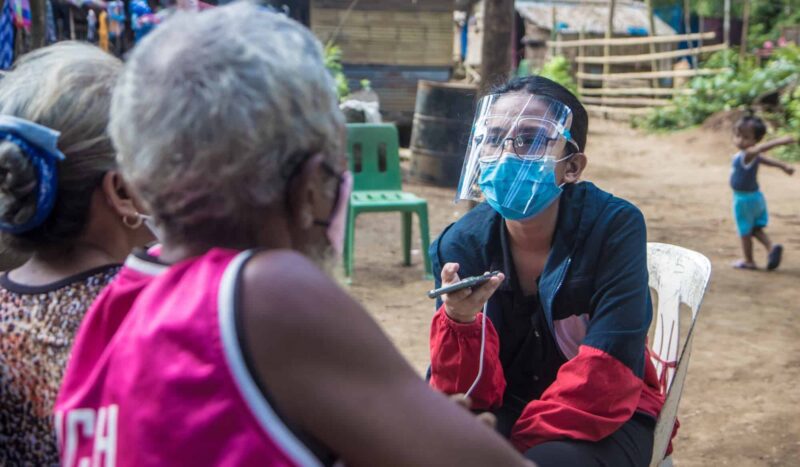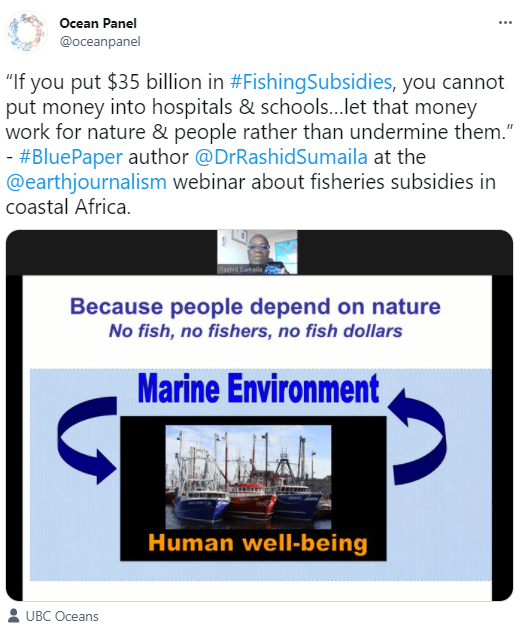Updates from Internews’ Earth Journalism Network
“Learn the science. In order to write an engaging story — and convince your editors that they should run it — journalists will need to understand the basic science behind climate change and the way it affects their communities. [But] remember that climate change is not just an environment or science story. Use different angles and sources.”
Imelda Abaño, climate journalist, media trainer and EJN’s Content Coordinator for the Philippines and Pacific, at our July webinar on how to turn global climate science into local stories.
This double edition of EJN’s newsletter is packed with updates, opportunities and resources. An EJN grantee’s story from Fiji helped spur action to save a village threatened by sea level rise — demonstrating the importance of journalism in a warming world. We awarded 14 journalists grants to report on fisheries subsidies worldwide and welcomed 18 new fellows from across the Mekong region to our data journalism program. From our media partners, we share updates on a video training for Indigenous women in Indonesia, a workshop on linking journalism to public policy in Bhutan and a collaborative course on climate change reporting in the Philippines.
We’re also announcing three new grant opportunities: In Bangladesh and eastern India, we’re seeking story ideas on how climate change is impacting human health; in Ecuador, we are looking to support reports on the impact of illegal, unreported and unregulated fishing in the Galapagos; and across Asia and the Pacific, we want to hear from journalists interested in investigating why more diseases are jumping from animals to humans and how to prevent the next pandemic. Plus, EJN has also created an e-learning course on zoonotic diseases that journalists can access freely. Finally, for climate journalists covering the IPCC’s new Working Group I report, we’ve got a fresh new tipsheet for you, and this week we’re hosting a webinar you won’t want to miss. Read on for more.
If you received this newsletter from a friend, subscribe here:
Delayed for 10 Years, Relocation of Fijian Village Threatened by Sea Level Rise Begins Following EJN Journalist’s Story
For the last decade, the residents of Fiji’s Narikoso village on Ono Island have watched the sea level rise and endanger their homes. The village is one of 40 the Fijian government has identified as being in need of relocation to higher ground due to the effects of climate change – but since 2011, when mitigation and adaptation efforts were first discussed by the government, they have still been waiting to move. Then, in September 2020, Fijian journalist Stanley Simpson learned about Narikoso from a source. Read more
EJN Awards Story Grants to Journalists Covering Fisheries Subsidies in Africa, South Asia and the Caribbean
As the World Trade Organization gears up to finalize global treaty negotiations on fisheries subsidies, we have selected 14 journalists from across the world to cover the effects of these often-harmful payments and incentives on biodiversity and fish stocks, artisanal fisher livelihoods, food sovereignty and other related topics. Read more
18 Journalists Awarded Mekong Data Journalism Fellowships in Round Two
EJN and the East-West Center, in partnership with the Stimson Center, have awarded Fellowships to 18 journalists in the Mekong region to enhance their data journalism skills and provide them with guidance and mentorship to report on water security and natural resources. Read more
Journalists from Bhutan Link Climate Change with Public Policies
Bhutan Media Foundation, an EJN media grantee, organized a two-day workshop, ‘Linking Climate Change with Public Policies.’ The journalists presented their climate change-related stories and shared their reporting experiences during the workshop. Read more
Indigenous Women from Mentawai Use Video to Air Environmental Concerns
Young Indigenous women in Mentawai Islands, off the coast of the Indonesian island of Sumatra, are getting a chance to learn how to make journalistic videos that will help them broadcast their concerns about their local environment. Read more
In the Philippines, EJN Offers a First-of-its-Kind Collaborative Climate Change Reporting Course
In the midst of the pandemic, interest in EJN’s first collaborative climate change reporting course in the Philippines has never been hotter. Fifteen journalists and environmental communicators benefited from this reporting course on multimedia stories, learning and exchanging views with environmental and climate change experts, brought together by EJN in partnership with the Asian Center for Journalism (ACFJ) at the Ateneo De Manila University. Read more
Webinars
EJN will be hosting two important webinars in August. Check out the announcements below for more information:
- The IPCC’s Working Group I Report: The Latest Science on Climate Change and its Implications for the Planet
EJN and the UN Foundation bring you this opportunity to learn directly from – and ask questions of – the co-authors of the new WG1 report, released just this week. ICYMI, here’s the recording of last month’s explainer webinar on how the IPCC works and what you need to know to cover it.
Date: August 12 | 9am DC / 2pm London / 6:30pm New Delhi / 8pm Bangkok
- Renewable Energy in India: Driving New Businesses and Innovations
India is the fourth most attractive renewable energy market in the world. But there are serious obstacles to its growth. How can journalists report on India’s RE prospects, problems and paths forward effectively? Hear from industry experts at this webinar.
Date: August 26 | 2:30pm India
Opportunities
- Health and environment journalists from Asia-Pacific, take note: EJN is offering grants to support the production of in-depth stories that focus on how infections like COVID-19 spread from animals to humans and on efforts to prevent future outbreaks by improving human, animal and environmental health. Apply by August 15.
- Calling all Ecuadorian journalists: Send us your pitches on illegal, unreported and unregulated fishing in Ecuador’s Galapagos Islands. We’re interested in stories that explore the impacts of IUU fishing on the environment, economy and livelihoods of artisanal fishing communities. Apply in Spanish by August 20.
- EJN is offering grants to journalists from Bangladesh and India to report on the impacts of climate change on human health along the Bay of Bengal coast. We encourage stories that report on potential solutions and address how vulnerable communities are responding to challenges. Apply by August 29.
Tips & Resources
- More than a year since Covid-19 journalism began to dominate the news cycle, zoonotic diseases continue to be a source of debate, conflict and misinformation worldwide. In response, EJN created a self-paced e-learning course for journalists to improve their reporting on zoonotic diseases and their environmental origins. Learn more and enroll now.
- On August 9, the Intergovernmental Panel on Climate Change (IPCC) released the Working Group 1 Report, providing a comprehensive review of the latest science behind climate change. For recommendations on how to unpack the contents of the report and use it to produce engaging, local journalism for your communities, read EJN’s handy new tipsheet.
- How do you produce hard-hitting environmental stories in a region as vast and complex as Asia? Five veteran journalists weigh in with advice, including EJN’s own Joydeep Gupta. Bookmark this interview for their hot tips on climate reporting, compiled by the Asia chapter of the Asian American Journalists Association (AAJA).
What we’re reading, watching, listening to
- Reading: This longform multimedia report produced by EJN geojournalism partner InfoNile, which dives into the rise of pandemic poachers. As tourism in wildlife conservancies across East Africa experienced an unprecedented slump during Covid-19, wildlife, and its local stewards, are increasingly at risk. This investigation was the collaborative effort of more than 30 journalists and data experts.
- Watching: A new nature documentary narrated by none other than Sir David Attenborough. Breaking Boundaries: The Science of Our Planet visits researchers working on melting ice, the degradation of the Amazon, Australia’s “summer from hell” and much more. Despite its urgent cautionary pronouncements, it also offers a clear path forward — and a message of hope.
- Listening to: Want to know more about the Covid-19 Delta variant and how to report on it? Our colleagues at Internews’ Health Journalism Network have just produced an exclusive podcast featuring the organization’s pandemic mentor Adele Baleta, an award-winning science journalist and vaccine safety communications advisor to the World Health Organization.
Connect with Us
Follow us on Facebook, Twitter, Instagram and LinkedIn to see how we’re covering today’s most pressing environmental issues and visit our website to read our latest stories.
Support Us
Your donation to EJN empowers and enables journalists from low- and middle-income countries to cover the environment more effectively in their local communities.

